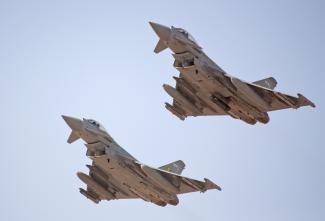Prof Anna Stavrianakis, University of Sussex, explains how UK arms exports to Saudi Arabia have helped fuel the world’s worst humanitarian crisis, and examines efforts to stop these exports.
Article from Responsible Science journal, no.2; advance online publication: 6 February 2020
As US-Iranian relations take a dramatic turn for the worse with the US government’s killing of Qassem Soleimani, and as British politics remains preoccupied with the results of the general election and Brexit, the prospects for the war in Yemen are looking increasingly bleak – and look set to continue to be ignored in mainstream British media and political debate.
Yemen death toll continues to mount
The latest round of war in Yemen, which has lasted nearly five years so far and shows little sign of abating, has a death toll that now exceeds 100,000 according to ACLED, the Armed Conflict Location and Event Data Project. [1] The Saudi-led coalition is responsible for the highest number of reported civilian fatalities – mostly from direct targeting in air strikes, conducted primarily with US- and UK-supplied weapons and accompanied by military and diplomatic support and advice. The latest UN Panel of Experts report [2] said individuals in the Saudi Arabian and UAE governments, as well as Houthi leaders, may be individually criminally liable for war crimes; and that arms-supplying states including the UK may be legally responsible if standards for complicity are met. The blockade of Yemen has pushed millions into famine, created an unprecedented cholera crisis, and helped destroy the infrastructure of Yemeni society. Despite strenuous UK government claims not to be a party to the war, the UK has long been intimately involved. [3]
Legal efforts to end UK arms exports
Where might accountability for the UK’s involvement in the world’s worst humanitarian disaster come from? One route is the law. Campaign Against Arms Trade (CAAT) launched a judicial review of government arms export policy, arguing that the government had failed to implement its policy that states it will not grant arms export licences where there is a clear risk that they might be used in serious violations of international humanitarian law. The case was first heard in the High Court in February 2017; in July of that year, the judges found in favour of the government. CAAT appealed, and a second hearing was heard at the Court of Appeal in April 2019. This time, the appeal judges found in CAAT’s favour, deciding that the government had failed to assess whether there was a past pattern of breaches of international law, and therefore that its policy was “irrational”. [4] The government was ordered not to issue any new licences for arms exports to Saudi Arabia, and to re-take its past decisions. The government tried to downplay the verdict, presenting it as an administrative technicality; it also appealed, and won the right to an appeal, so the case will be heard in the Supreme Court at some point in the future. The government has also since admitted “inadvertently” issuing new licences for weapons exports to the Saudi-led coalition that could be used in the war in Yemen. [5] Pledging an internal investigation and a review by the Department of Work and Pensions, Secretary of State for International Trade Liz Truss also conceded that it is possible that more cases will come to light. No further word has come from government about its internal review of its processes, nor its legally mandated task of re-taking its past arms export decisions. The legal route is therefore rocky but ongoing.
Parliamentary efforts
In Parliament meanwhile, the announcement of a general election put an end to the last iteration of the parliamentary Committees on Arms Export Controls (CAEC). This is a so-called super-committee made up of members of the Defence, Foreign Affairs, International Development and International Trade Committees. The CAEC has not met formally since May 2019 and in the 2017-19 Parliament had refused to put the war in Yemen on its agenda, relying on a handful of active MPs to shoehorn Yemen and UK support for the Saudi coalition into the discussion at any available opportunity. The last Chair of the CAEC, Labour MP Graham Jones, was unashamedly pro-Saudi and pro-UAE in ways that stymied any reasonable interpretation of impartiality. The MP for Hyndburn, a Lancashire constituency that is home to many BAE Systems workers, Jones lost his seat in the election to Conservative Sara Britcliffe. The CAEC has yet to be re-established since the Conservative Party victory in the general election.
The role for engineers, scientists and campaigners
So the law and Parliament are ambivalent routes for accountability for Britain’s involvement in the war in Yemen. They also sometimes feel remote to us as citizens, residents, workers and political beings. There are other routes that we can take as individuals – supporting organisations like Scientists for Global Responsibility and Campaign Against Arms Trade are one obvious example. There are also things scientists and engineers can do in a professional capacity: work as part of a trade union to break the link between arguments about jobs and government support for manufacturing and for STEM subjects in education and the uncritical support for military spending, military production, and arms exports that usually accompanies them. Conversations with colleagues and friends about what problems scientists’ and engineers’ considerable talents and skills should be oriented towards can repoliticise what has become depoliticised, namely the question of the end to which we apply our skills. These can be less formal actions, but alongside more traditional actions like writing to MPs to raise the profile of the war in Yemen, they can be effective in facilitating accountability for the UK’s role in the war and the ensuing humanitarian disaster.
Anna Stavrianakis is Professor of International Relations at the University of Sussex.
References
[1] ACLED (2019). https://www.acleddata.com/2019/10/31/press-release-over-100000-reported-killed-in-yemen-war/
[2] The Guardian (2019a). https://www.theguardian.com/world/2019/sep/03/uk-us-and-france-may-be-complicit-in-yemen-war-crimes-un-report
[3] See, for example: The Guardian (2019b). https://www.theguardian.com/world/2019/jun/18/the-saudis-couldnt-do-it-without-us-the-uks-true-role-in-yemens-deadly-war
